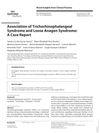 29 citations,
November 2022 in “Nature Medicine”
29 citations,
November 2022 in “Nature Medicine” Genetic variations greatly affect individual metabolism and can impact health and disease risk.
[object Object]  29 citations,
May 2018 in “Clinical Endocrinology”
29 citations,
May 2018 in “Clinical Endocrinology” Recent genetic insights show that low-renin hypertension includes a range from essential hypertension to secondary or familial forms, affecting diagnosis and treatment.
 27 citations,
June 2019 in “Aesthetic Plastic Surgery”
27 citations,
June 2019 in “Aesthetic Plastic Surgery” Platelet-Rich Plasma (PRP) treatment may increase hair growth for genetic hair loss, but more research is needed to confirm this.
 26 citations,
July 2019 in “Dermatology and Therapy”
26 citations,
July 2019 in “Dermatology and Therapy” The conclusion is that genetic testing is important for diagnosing and treating various genetic hair disorders.
 24 citations,
October 2014 in “Cold Spring Harbor Perspectives in Medicine”
24 citations,
October 2014 in “Cold Spring Harbor Perspectives in Medicine” Genetic research has advanced our understanding of skin diseases, but complex conditions require an integrative approach for deeper insight.
 23 citations,
January 2020 in “Central-European Journal of Immunology/Central European Journal of Immunology”
23 citations,
January 2020 in “Central-European Journal of Immunology/Central European Journal of Immunology” Alopecia areata, a type of hair loss, is likely an autoimmune disease with a genetic link, but its exact cause is still unknown.
19 citations,
August 2017 in “American journal of clinical dermatology” Hepatitis B virus exposure may be linked to increased risk of alopecia areata.
14 citations,
July 2021 in “Anais brasileiros de dermatologia/Anais Brasileiros de Dermatologia” Interleukin levels are higher in alopecia areata patients but don't predict disease severity or duration.
 11 citations,
February 2003 in “Baillière's best practice & research. Clinical obstetrics & gynaecology/Baillière's best practice and research in clinical obstetrics and gynaecology”
11 citations,
February 2003 in “Baillière's best practice & research. Clinical obstetrics & gynaecology/Baillière's best practice and research in clinical obstetrics and gynaecology” Acne and increased body hair in teenage girls are normal but severe cases may need hormone evaluation and treatment can prevent diabetes linked to PCO.
9 citations,
January 2013 in “International journal of trichology” 88% phenol is effective for treating alopecia areata.
 8 citations,
December 2015 in “PubMed”
8 citations,
December 2015 in “PubMed” Phyllanthus niruri extract may help treat hair loss by promoting hair growth and blocking a hair loss-related enzyme.
7 citations,
January 2001 in “PubMed” Vitamin B6 reduced hair loss in women with diffuse alopecia, but calcium pantothenate had no clear positive effect.
5 citations,
February 2021 in “Gels” HYDRO DELUXE BIO hyaluronic acid hydrogel is compatible with skin cells, may reduce inflammation, promote blood vessel growth, and protect against oxidative stress, suggesting it could help revitalize hair follicles.
 5 citations,
January 2017 in “Endocrinology”
5 citations,
January 2017 in “Endocrinology” Genetic defects in testosterone production can cause hormonal and developmental disorders, and more research is needed to understand androgen regulation and develop safer treatments.
 5 citations,
January 1998 in “Clinical and experimental dermatology”
5 citations,
January 1998 in “Clinical and experimental dermatology” Myotonic dystrophy should be considered in patients with hair thinning, and genetic counseling is important.
4 citations,
July 2019 in “Vestnik Rossiĭskoĭ akademii meditsinskikh nauk / Rossiĭskaia akademiia meditsinskikh nauk” Both genetics and lifestyle factors contribute to male pattern baldness.
 3 citations,
April 2023 in “Quality Assurance and Safety of Crops & Foods”
3 citations,
April 2023 in “Quality Assurance and Safety of Crops & Foods” Prinsepia utilis seed oil is suitable for making pharmaceutical soap.
 3 citations,
November 2022 in “European Journal of Human Genetics”
3 citations,
November 2022 in “European Journal of Human Genetics” New models predict male pattern baldness better than old ones but still need improvement.
 2 citations,
October 1990 in “The Lancet”
2 citations,
October 1990 in “The Lancet” Some people have a genetic variation that makes them less effective at breaking down drugs.
 1 citations,
September 2023 in “Journal of cosmetic dermatology”
1 citations,
September 2023 in “Journal of cosmetic dermatology” Silybum marianum flower extract may help increase hair growth and decrease hair loss.
1 citations,
January 2023 in “Frontiers in genetics” Certain genetic markers linked to wool quality in Rambouillet sheep were identified, which can guide better breeding choices.
 1 citations,
January 2020 in “Skin appendage disorders”
1 citations,
January 2020 in “Skin appendage disorders” A family was found with both Trichorhinophalangeal syndrome and Loose Anagen Syndrome, suggesting a genetic connection.
 1 citations,
January 2015 in “Case reports in endocrinology”
1 citations,
January 2015 in “Case reports in endocrinology” Women with nonclassical congenital adrenal hyperplasia may have a higher risk of fertility issues and miscarriages, and should get genetic counseling.
 January 2025 in “Nutrients”
January 2025 in “Nutrients” Genetic factors and diet significantly increase the risk of male pattern baldness.
 August 2024 in “Pakistan Journal of Health Sciences”
August 2024 in “Pakistan Journal of Health Sciences” PRP with finasteride is better for hair regrowth than minoxidil with finasteride.
Certain genes may influence hair loss differently in men and women.
[object Object] Genetic analysis of rabbits identified key genes for traits like coat color, body size, and fertility.
March 2024 in “Agriculture” CRISPR/Cas9 gene-editing shows promise for improving sheep and goat breeding but faces challenges with efficiency and accuracy.
 January 2023 in “Revista Paulista de Pediatria”
January 2023 in “Revista Paulista de Pediatria” A Brazilian male with IFAP syndrome has a unique genetic variant causing his condition.
September 2022 in “Düzce Tıp Fakültesi Dergisi” Infertility requires quick, thorough, and cost-effective evaluation, including medical history, physical exams, and psychological support.



















